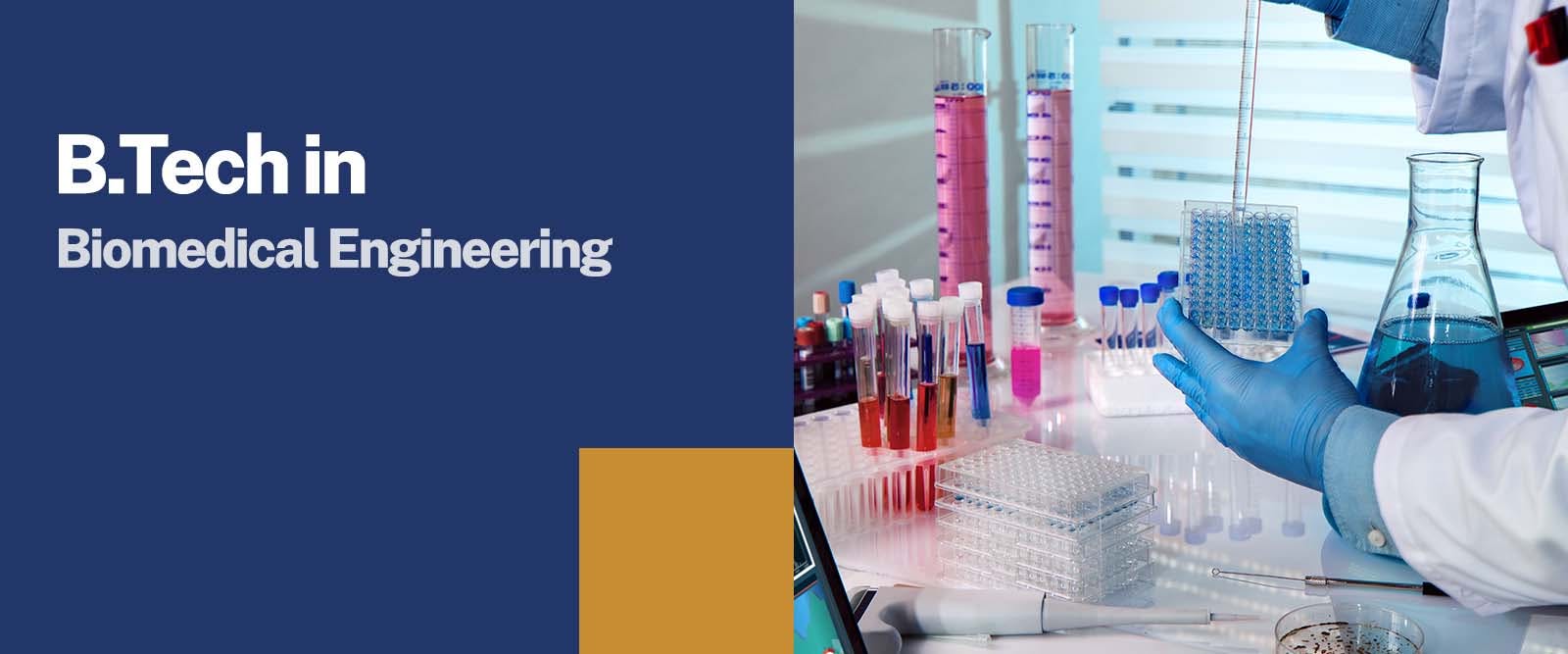5800 students unlocked their dream jobs with UG/PG programs in top colleges. Apply Now!
The field of biomedical engineering is a recent addition to the academic offerings in India, and it is gaining immense popularity among Indian students. With the rapid growth of the Indian economy, new opportunities are arising in various sectors, such as manufacturing, hospitals, universities, research facilities of companies, and educational and medical institutions.
The conditions for admission to the B.Tech program in Biomedical Engineering may vary among universities. A few colleges consider the entrance exam scores and the results of the 10+2 examination to enrol students. This article has outlined the eligibility requirements, syllabus, job prospects, and salary trends associated with pursuing a B.Tech degree in Biomedical Engineering.
B.Tech Biomedical Course Details
|
Particulars |
Details |
|
Course Name |
Bachelor of Technology in Biomedical Engineering - B.Tech |
|
Level of Programme |
Undergraduate |
|
Duration |
Four years |
|
Type of Evaluation/Examination |
Semester-end |
|
Eligibility Criteria |
10+2 or equivalent from a recognised board with subjects such as Physics, Chemistry and Mathematics. |
|
Admission Process |
Entrance-based |
|
Average Fees |
4 lakhs to 10 lakhs per annum |
|
Average Salary |
5 lakhs to 12 lakhs per annum |
|
Top Recruiting Companies |
Larson & Turbo (L&T), Sanofi, Wipro, etc. |
|
Top Job Roles |
Research Scientists, Clinical Researchers, Biomedical Engineers, etc. |
What is B.Tech in Biomedical Engineering?
The B.Tech Biomedical Engineering program combines the principles of engineering with medical knowledge to create effective healthcare analytics, tracking, and treatment solutions. By utilising concepts from physical science to understand biological entities, this program bridges the gap between the two fields. Students graduating with a biomedical B.Tech degree from one of the best B.Tech colleges can expect to
- Gain skills in a variety of areas, including working in a multidisciplinary environment involving both engineering and healthcare,
- Analyse real-world problems and design technically-sound, cost-effective, and socially acceptable healthcare solutions.
- Develop professionalism, ethical attitudes, communication skills, and the ability to work in teams and adapt to changing trends through lifelong learning.
Eligibility Criteria for Admission to the B.Tech Biomedical Course
There are certain prerequisites that students must meet in order to pursue a career in biomedical engineering. These prerequisites may vary from one B.Tech college to another. To be eligible for a B.Tech program in Biomedical Engineering, students must meet the following criteria:
- Students must have an equivalent degree or must have completed their 12th-grade education from a recognised institute or board.
- Additionally, students must have taken one of the following optional subjects as a major: Chemistry, Biology, Biotechnology, Mathematics, or Physics.
- In order to qualify for the entrance exam, students must have an aggregate score of 50%, or 45%, if they belong to a reserved category.
- Students who are waiting for their final exam results can also apply for admission into the B.Tech program in Biomedical Engineering.
B.Tech Biomedical Engineering Course Syllabus
The Biomedical Engineering B.Tech course is a four-year program comprising eight semesters. The majority of engineering institutions cover the same topics in their Biomedical Engineering B.Tech program. The complete syllabus for the B.Tech Biomedical Engineering course is listed below.
Semester I
- Mathematics 1
- Engineering Mechanics
- Engineering Physics 1
- Engineering Chemistry 1
- Basics of Biomedical Engineering
- Practical
Semester II
- Mathematics 2
- Engineering Mechanics
- Physical Chemistry
- Engineering Physics 2
- Thermodynamics
- Material Sciences
- Workshop
Semester III
- Biomedical Process in Industries
- Statistical Methods
- Electric Circuits
- Bio-Technology
- Human Physiology and Anatomy
- Open Elective
Semester IV
- Biofluids and Dynamics
- Radiological Equipment and Principles
- Electronics Circuits
- Open Elective
- Human Physiology and Anatomy
- Biomedical Process in Industries
Semester V
- Applications of Microprocessor
- Instrumentation of Medical
- Biomechanics
- Open Elective
- Biomedical Expert System
Semester VI
- Diagnostic and Therapeutic Equipment
- Biomedical Signal Processing
- Biomedical Embedded Systems
- Open Elective
Semester VII
- Hospital Safety and Management
- Open Elective II
- Open Elective III
- Project
- Practical Paper
Semester VIII
- Biomedical Processing Technology
- Open Elective IV
- Open Elective V
- Internship
- Practical Paper
B.Tech Biomedical Technology Careers
There is immense scope of biomedical engineering with numerous career options available after graduation in India. This field is blooming with opportunities in management, laboratory work, education, research, and consulting. Below are some famous job roles for Biomedical B.Tech students after graduation.
- Biomedical Engineer: The role of biomedical engineers is to improve patient treatment by designing and developing solutions to biological and medical problems. They collaborate with doctors and researchers to create medical systems, equipment, and devices that can help solve clinical problems.
- Laboratory Technician: Laboratory technicians can work in various fields of science, such as forensics, health, and manufacturing. They conduct investigations and tests based on the area of science they work in, such as performing blood tests or evaluating cells in a medical setting, or testing food and drink samples for contamination or quality in a food and beverage manufacturing setting.
- Software Engineer: Software engineers with a B.Tech in Biomedical Engineering may specialise in designing and developing computer programs for various medical applications. They evaluate customers' needs and create computer software to meet those requirements, focusing on hardware, software, and gadgets.
- Clinical Laboratory Scientists: Clinical laboratory scientists conduct a range of diagnostic analyses on body fluids and other specimens, including chemical, haematological, immunological, histopathological, cytopathological, microscopic, and bacteriological analyses. They work with a variety of body fluids and specimens to diagnose illnesses and diseases.
Salary Trends for B.Tech Biomedical Engineering Course
The salaries of biomedical engineers may vary depending on a person's skills and experience. The remuneration also differs depending on the job profile. An increase in pay scale comes with the gain of new skills and relevant work experience over time. Below are some salary figures for reference only.
|
Job Role |
Average Salary |
|
Biomedical Engineer |
10 lakhs per annum |
|
Laboratory Technician |
9 lakhs per annum |
|
Software Engineer |
12 lakhs per annum |
|
Clinical Laboratory Scientist |
8 lakhs per annum |
Conclusion
Several Indian institutes offer B.Tech in Biomedical Engineering, and admission is based on academic achievements and entrance examination results. For admission assistance into leading B.Tech institutes, you can register with Sunstone. Sunstone is present in 35+ cities across India powering 50+ colleges with Sunstone’s benefits. At Sunstone, we offer career enhancement courses and industry-relevant training modules to help you expand your professional skills and opportunities. After completing the course, registered students will get placement assistance with internship opportunities.
FAQ - B.Tech Biomedical Engineering
Is B.Tech biomedical engineering good?
Yes. For students who possess an aptitude for science and creativity, bioengineering can be a highly satisfying career path. In the future, biomedical engineers will continue to be useful in the advancement of new medical technologies and the enhancement of healthcare quality worldwide.
What can I do after my B.Tech in biomedical engineering?
Students who have completed a B.Tech degree in Biomedical Engineering can secure employment in public and private organisations as Biomedical Engineers, Clinical Researchers, Lecturers/Professors, Content Developers, Research Scientists, etc. They are typically employed in hospitals, medical industries, laboratories, and similar settings.
Are biomedical engineers in demand?
Certainly, the Bureau of Labor Statistics has predicted a 9.8% increase in employment opportunities for biomedical engineers from 2021 to 2031, with an expected 1,700 job openings during this time. Biomedical engineering is a profession that aims to resolve biological and medical issues through research and development.
HELP
Take the first step towards your dream job.
ABOUT THE AUTHOR

